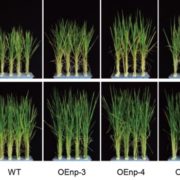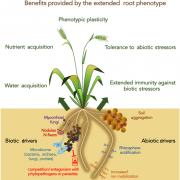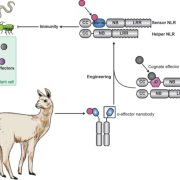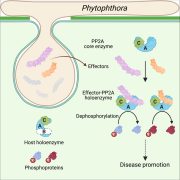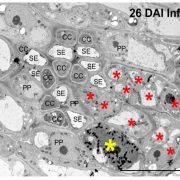SWEET sugar transporters orchestrate distribution of microbiota along the root longitudinal axis
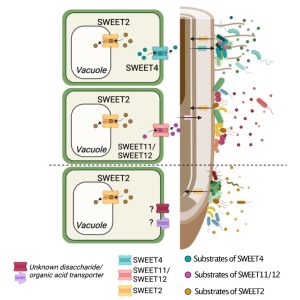 Plant roots are functionally distinct along the longitudinal axis due to different cell types and diverse metabolic states. Root-secreted metabolites are involved in the assembly of complex microbial communities, yet the relationships between root-metabolites and organization of root microbiota at the spatial scale is poorly understood. This is partly because of a lack of suitable system to study such relationships by simultaneous profiling of metabolites and microbiota along the longitudinal axis of roots. Loo et al. developed two complementary plant growth systems, CD-rhizotron and ArtSoil, to study such relationships. Through bacterial community profiling (root endospheric and rhizosphere fractions) and metabolomics analyses, they showed that differential microbial community structure coincided with a differential metabolite accumulation along the longitudinal axis, suggesting spatial metabolite profiles could be implicated for orchestrating the microbial community. Further, applying bioinformatics, GUS histochemical analyses, and Arabidopsis mutant lines, they discovered a relationship between SWEET transporters (sugar transporters) and microbial communities along the longitudinal root axes. Specifically, several SWEET uniporters were induced by microbiota along the longitudinal root axis, and they contributed to microbial community assembly. This study established the spatial coordination between sugar transporters and microbial community assembly in roots. (Summary by Arijit Mukherjee @ArijitM61745830) Cell Host Microbe 10.1016/j.chom.2024.02.014
Plant roots are functionally distinct along the longitudinal axis due to different cell types and diverse metabolic states. Root-secreted metabolites are involved in the assembly of complex microbial communities, yet the relationships between root-metabolites and organization of root microbiota at the spatial scale is poorly understood. This is partly because of a lack of suitable system to study such relationships by simultaneous profiling of metabolites and microbiota along the longitudinal axis of roots. Loo et al. developed two complementary plant growth systems, CD-rhizotron and ArtSoil, to study such relationships. Through bacterial community profiling (root endospheric and rhizosphere fractions) and metabolomics analyses, they showed that differential microbial community structure coincided with a differential metabolite accumulation along the longitudinal axis, suggesting spatial metabolite profiles could be implicated for orchestrating the microbial community. Further, applying bioinformatics, GUS histochemical analyses, and Arabidopsis mutant lines, they discovered a relationship between SWEET transporters (sugar transporters) and microbial communities along the longitudinal root axes. Specifically, several SWEET uniporters were induced by microbiota along the longitudinal root axis, and they contributed to microbial community assembly. This study established the spatial coordination between sugar transporters and microbial community assembly in roots. (Summary by Arijit Mukherjee @ArijitM61745830) Cell Host Microbe 10.1016/j.chom.2024.02.014


